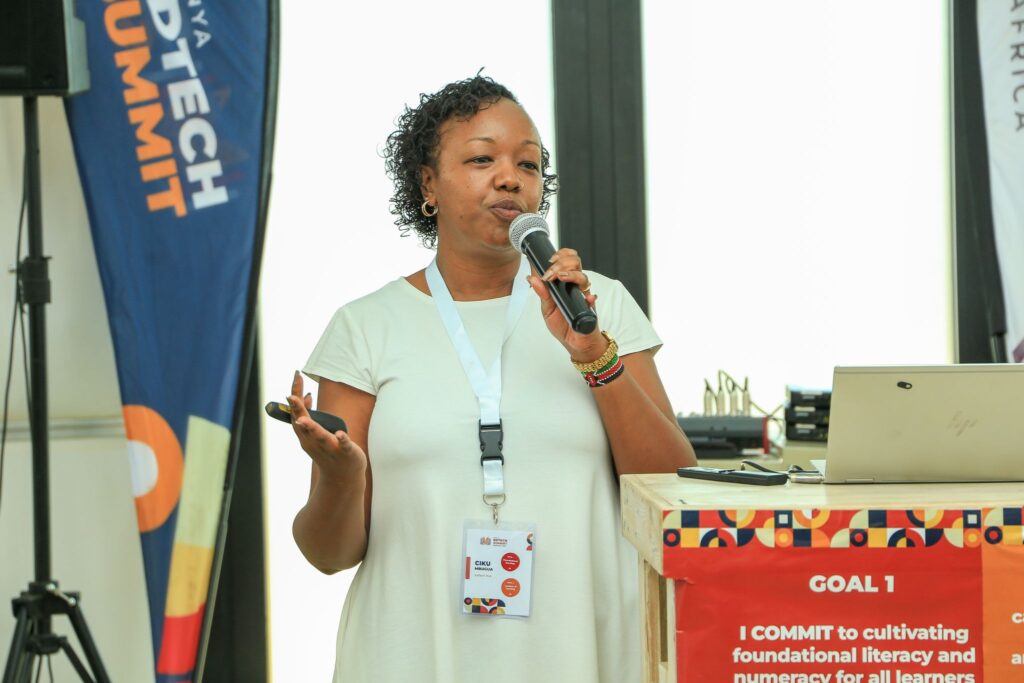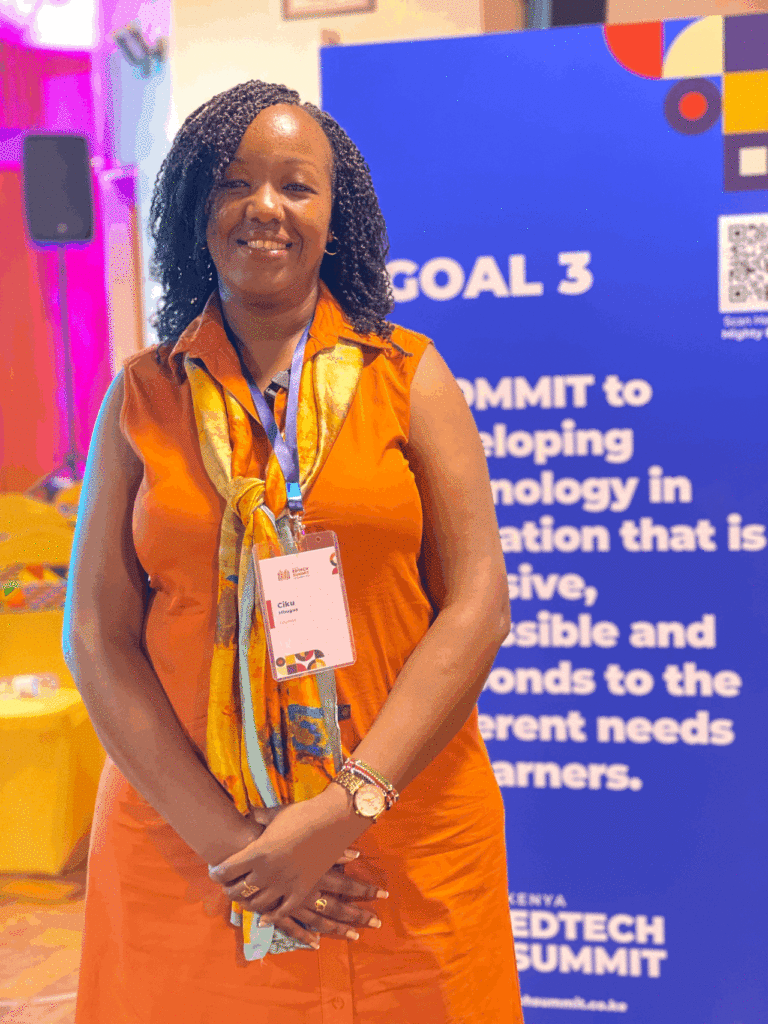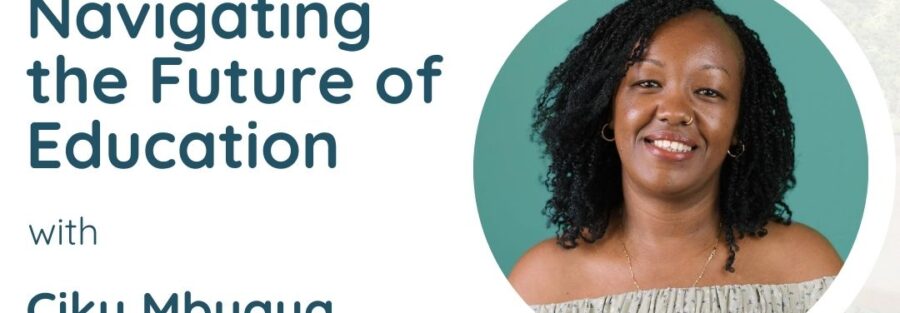In a world where the educational landscape is shifting rapidly, technology isn’t just a tool—it’s a catalyst for change. Wanjiku Mbugua, Innovation Manager at Brink and Country Lead-Kenya at EdTech Hub, is at the forefront of this transformation. As a member of the Technical Advisory Board for Dignitas, Wanjiku brings a dynamic mix of experience and visionary thinking to the intersection of innovation, education, and technology. In this blog, we explore her thoughts on the future of EdTech, the hurdles and opportunities the sector presents, and her bold vision for the future of education in Kenya.
Starting the day with purpose.
For Wanjiku, a simple cup of coffee sometimes sets the stage for a productive day, but what truly energizes her is the drive to revolutionize education through technology. Her passion for EdTech isn’t just about advancing tools and techniques; it’s about reshaping the future of learning in Kenya and beyond.
Empowering teachers with technology
When discussing EdTech tools, Ciku champions those that empower teachers, making their roles not just easier but profoundly impactful. She highlights tools from organizations like Angaza Elimu and Kurasa, which assist teachers directly in the classroom, and the EIDU app,a digital personalized learning tool that supports structured pedagogy and teaching at the right level. “These tools aren’t merely conveniences; they’re about equipping teachers to embrace technology, harness data, and refine their teaching strategies for maximum impact,” she asserts.

A Vision for tech-enhanced education
Ciku envisions a future where technology is seamlessly integrated into education, transforming how teachers and school leaders operate. She foresees a world where data-driven insights fuel better decision-making, and Artificial Intelligence (AI) becomes a powerful ally in assessments and performance tracking. “As technology takes root in classrooms, teachers will innovate more, leveraging AI to generate tailored educational content that is not just accurate but transformative,” she predicts.
Embracing the AI revolution
Generative AI is making waves across industries, and education is no exception. Wanjiku is a strong advocate for embracing this shift, urging the focus to be on upskilling teachers to harness AI’s potential effectively. She commends the Kenyan government’s proactive stance on using AI to enhance educational assessments. “AI should be seen as an enabler, not a threat,” she emphasizes.
Building trust and agility in EdTech
Navigating the EdTech landscape requires more than just innovative ideas—it demands trust and agility. Wanjiku underscores the importance of building strong relationships with the government, which plays a pivotal role in children’s education. However, she also stresses the need for the government to be more agile in adapting to the fast-paced changes in education. “Building trust takes time, but it’s crucial for the successful adoption of innovative solutions,” she says.
The Sandbox Tool – A Key to Innovation
Ciku speaks highly of EdTech Hub’s Sandbox method, a critical component of the innovation process. The Sandbox helps to validate and scale EdTech interventions in conditions of uncertainty.. The Sandbox approach, with its short, iterative sprints, has been instrumental in testing and growing EdTech interventions with different partners in eight countries. . “It’s about ensuring we have tested and course corrected where necessary before an intervention is implemented at scale. ” Wanjiku explains..
Strategic foresight for Dignitas
In her role on the Technical Advisory Board, Wanjiku leverages her foresight knowledge to guide strategic planning for Dignitas. By anticipating trends and aligning innovations like LeadNow with the needs of educators and government priorities, she helps position Dignitas as a leader in the EdTech space. “It’s about staying ahead of the curve and ensuring our initiatives are not just relevant but transformative.”

Balancing Innovation with Evidence
While innovation is vital, she believes it must align with broader educational goals. Building relationships with the government and understanding their priorities beyond policy is essential. This approach helps navigate the challenge of an education system evolving faster than the teachers themselves. “By aligning innovation with government priorities, Dignitas ensures our initiatives are relevant, cutting-edge and impactful,” she emphasizes.
A vision for Dignitas- Leading the way in EdTech
Looking ahead, Ciku envisions Dignitas as a trailblazer in Kenya’s EdTech space. She sees the organization on the ground, setting trends and generating demand for its solutions. “With initiatives like LeadNow being properly adopted, Dignitas could secure a prominent role in shaping education policy and practice,” she foresees.
Finding Joy in Impact
For Wanjiku, the most rewarding moments come from seeing the tangible impact of her work. Whether it’s observing learners engage with tools that enhance their education or seeing teachers embrace technology with confidence, these moments are a powerful reminder of why she does what she does. “It’s about inspiring a love for technology in teachers and ensuring every child has access to quality education,” she concludes.
Follow us on socials as we continue to equip and empower educators in underserved communities who will transform opportunities for the next generation.

